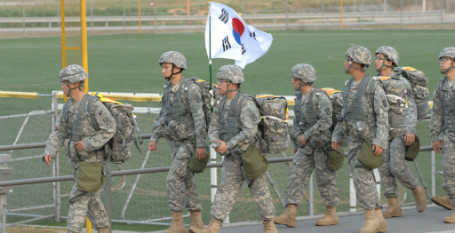The National Human Rights Commission of Korea said the Center for Military Human Rights Korea (CMHRK) last month began an investigation into the Korean army chief’s hunt to punish homosexual soldiers.
The CMHRK claimed the search put 40 to 50 soldiers on the list and that soldiers were humiliated, had their mobile phones confiscated without a warrant, and were threatened that the military would disclose their sexual orientation unless they cooperated with investigations.
The CMHRK and sexual minority groups state subjecting homosexual soldiers to investigations on the basis of their orientation is a grave violation of human rights.
The rights group called for abolishing the clause in the military penal code banning gay sex a number of times since 2006.
The new president Moon Jae-in ordered ministries to respect the human rights watchdog’s recommendations and that this would be reflected in the evaluation of ministers.
Last month, army captain in South Korea was dishonourably discharged and handed a suspended six-month prison sentence after a military court on Wednesday found him guilty of having sex with another man.
Although homosexual sex is legal in South Korea, same-sex activity in the army is punishable by up to two year’s imprisonment.
The captain was convicted of violating the Military Criminal Act which states that a soldier engaging in sodomy or "other disgraceful conduct" can be put in jail for up to two years. Gay sex is not illegal for civilians.
The court case came after General Jang Jun-kyu, South Korea’s army chief of staff, launched a “track-down process” to locate and expose suspected gay personnel.
“President Moon Jae-in needs to send an unequivocal message that discrimination on the basis of sexual orientation or gender identity will not be tolerated, including in the military,” said East Asia Research Director at Amnesty International, Roseann Rife.
“It is long overdue for South Korea to repeal this archaic and discriminatory provision in the military criminal code, and get up-to-date when it comes to the rights of lesbian, gay, bisexual, transsexual and intersex people.”
One such soldier, spoke to CNN and said the military had contacted him saying it knew about himself and his ex-partner’s “crimes.”
“They knew that I would not want my identity revealed so they made me cooperate in the investigation,” he said. “The atmosphere was very oppressive and humiliating. I was scared."

